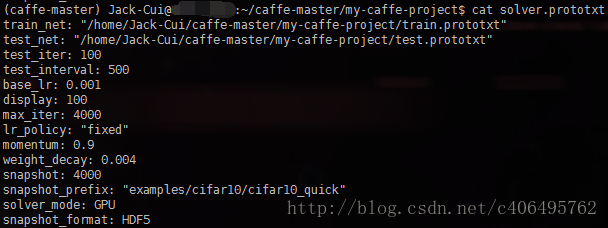这篇文章将为大家详细讲解有关如何使用pycaffe生成solver.prototxt文件并进行训练,文章内容质量较高,因此小编分享给大家做个参考,希望大家阅读完这篇文章后对相关知识有一定的了解。
下面主要记录如何生成sovler文件,solver文件是训练的时候,需要用到的prototxt文件,它指明了train.prototxt和test.prototxt或train_test.prototxt。solver就是用来是loss最小化的优化方法。
一、solver.prototxt参数说明
依然是以cifar10_quick_solver.prototxt为例,内容如下:
# reduce the learning rate after 8 epochs (4000 iters) by a factor of 10# The train/test net protocol buffer definitionnet: "examples/cifar10/cifar10_quick_train_test.prototxt"# test_iter specifies how many forward passes the test should carry out.# In the case of MNIST, we have test batch size 100 and 100 test iterations,# covering the full 10,000 testing images.test_iter: 100# Carry out testing every 500 training iterations.test_interval: 500# The base learning rate, momentum and the weight decay of the network.base_lr: 0.001momentum: 0.9weight_decay: 0.004# The learning rate policylr_policy: "fixed"# Display every 100 iterationsdisplay: 100# The maximum number of iterationsmax_iter: 4000# snapshot intermediate resultssnapshot: 4000snapshot_format: HDF5snapshot_prefix: "examples/cifar10/cifar10_quick"# solver mode: CPU or GPUsolver_mode: GPU这些参数,都是有根据进行设置的,从上到下依次进行说明:
net:指定配置文件,cifar10_quick_solver.prototx文件中指定的prototxt文件为examples/cifar10/cifar10_quick_train_test.prototxt,可以使用train_net和test_net分别指定。
test_iter:测试迭代数。例如:有10000个测试样本,batch_size设为32,那么就需要迭代 10000/32=313次才完整地测试完一次,所以设置test_iter为313。
test_interval:每训练迭代test_interval次进行一次测试,例如50000个训练样本,batch_size为64,那么需要50000/64=782次才处理完一次全部训练样本,记作1 epoch。所以test_interval设置为782,即处理完一次所有的训练数据后,才去进行测试。
base_lr:基础学习率,学习策略使用的参数。
momentum:动量。
weight_decay:权重衰减。
lr_policy:学习策略。可选参数:fixed、step、exp、inv、multistep。
lr_prolicy参数说明:
fixed: 保持base_lr不变;
step: step: 如果设置为step,则需要设置一个stepsize,返回base_lr * gamma ^ (floor(iter / stepsize)),其中iter表示当前的迭代次数;
exp: 返回base_lr * gamma ^ iter,iter为当前的迭代次数;
inv: 如何设置为inv,还需要设置一个power,返回base_lr * (1 + gamma * iter) ^ (- power);
multistep: 如果设置为multistep,则还需要设置一个stepvalue,这个参数和step相似,step是均匀等间隔变化,而multistep则是根据stepvalue值变化;
stepvalue参数说明:
poly: 学习率进行多项式误差,返回base_lr (1 - iter/max_iter) ^ (power);
sigmoid: 学习率进行sigmod衰减,返回base_lr ( 1/(1 + exp(-gamma * (iter - stepsize))))。
display:每迭代display次显示结果。
max_iter:最大迭代数,如果想训练100 epoch,则需要设置max_iter为100*test_intervel=78200。
snapshot:保存临时模型的迭代数。
snapshot_format:临时模型的保存格式。有两种选择:HDF5 和BINARYPROTO ,默认为BINARYPROTO
snapshot_prefix:模型前缀,就是训练好生成model的名字。不加前缀为iter_迭代数.caffemodel,加之后为lenet_iter_迭代次数.caffemodel。
solver_mode:优化模式。可以使用GPU或者CPU。
二、使用python生成solver.prototxt文件
以分析的cifar10_quick_solver.prototxt文件为例,使用python程序,生成这个文件。
1.代码如下:
# -*- coding: UTF-8 -*-import caffe #导入caffe包def write_sovler():my_project_root = "/home/Jack-Cui/caffe-master/my-caffe-project/" #my-caffe-project目录sovler_string = caffe.proto.caffe_pb2.SolverParameter() #sovler存储solver_file = my_project_root + 'solver.prototxt' #sovler文件保存位置sovler_string.train_net = my_project_root + 'train.prototxt' #train.prototxt位置指定sovler_string.test_net.append(my_project_root + 'test.prototxt') #test.prototxt位置指定sovler_string.test_iter.append(100) #测试迭代次数sovler_string.test_interval = 500 #每训练迭代test_interval次进行一次测试sovler_string.base_lr = 0.001 #基础学习率 sovler_string.momentum = 0.9 #动量sovler_string.weight_decay = 0.004 #权重衰减sovler_string.lr_policy = 'fixed' #学习策略 sovler_string.display = 100 #每迭代display次显示结果sovler_string.max_iter = 4000 #最大迭代数sovler_string.snapshot = 4000 #保存临时模型的迭代数sovler_string.snapshot_format = 0 #临时模型的保存格式,0代表HDF5,1代表BINARYPROTOsovler_string.snapshot_prefix = 'examples/cifar10/cifar10_quick' #模型前缀sovler_string.solver_mode = caffe.proto.caffe_pb2.SolverParameter.GPU #优化模式with open(solver_file, 'w') as f:
f.write(str(sovler_string))
if __name__ == '__main__':
write_sovler()2.运行结果:

三、训练模型
从第一篇笔记至此,我们已经了解到如何将jpg图片转换成Caffe使用的db(levelbd/lmdb)文件,如何计算数据均值,如何使用python生成solver.prototxt、train.prototxt、test.prototxt文件。接下来,就可以进行训练的最后一步,使用caffe提供的python接口训练生成模型。如果不进行可视化,只想得到一个最终的训练model,可以使用如下代码:
import caffe
my_project_root = "/home/Jack-Cui/caffe-master/my-caffe-project/" #my-caffe-project目录solver_file = my_project_root + 'solver.prototxt' #sovler文件保存位置caffe.set_device(0) #选择GPU-0caffe.set_mode_gpu()
solver = caffe.SGDSolver(solver_file)
solver.solve()现在,如何训练生成模型的简单步骤已经讲完。接下来,以mnist实例,整合所学内容,训练生成model,并使用生成的model进行预测。
关于如何使用pycaffe生成solver.prototxt文件并进行训练就分享到这里了,希望以上内容可以对大家有一定的帮助,可以学到更多知识。如果觉得文章不错,可以把它分享出去让更多的人看到。
亿速云「云服务器」,即开即用、新一代英特尔至强铂金CPU、三副本存储NVMe SSD云盘,价格低至29元/月。点击查看>>
免责声明:本站发布的内容(图片、视频和文字)以原创、转载和分享为主,文章观点不代表本网站立场,如果涉及侵权请联系站长邮箱:is@yisu.com进行举报,并提供相关证据,一经查实,将立刻删除涉嫌侵权内容。
原文链接:https://my.oschina.net/u/4890645/blog/4806963